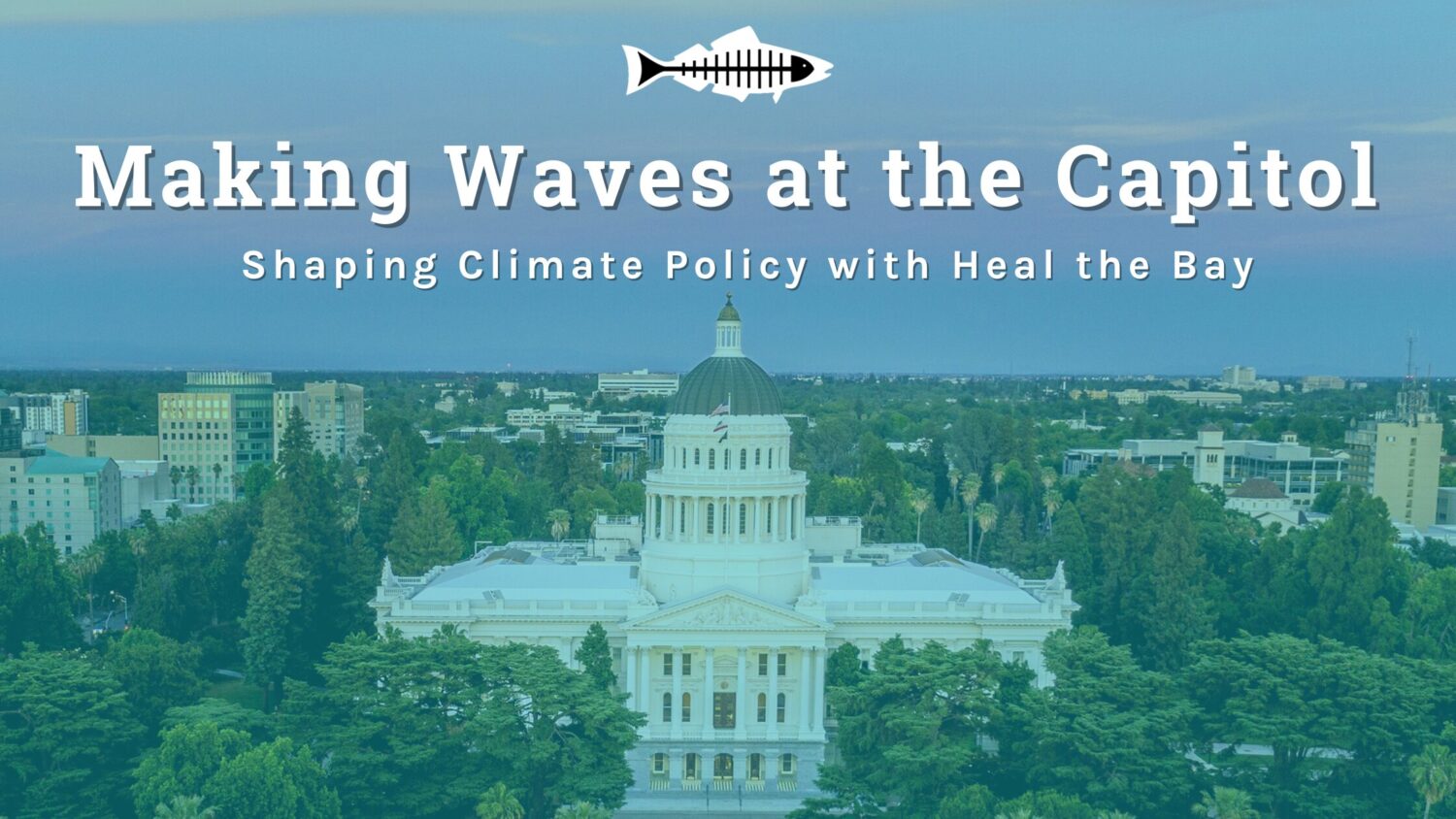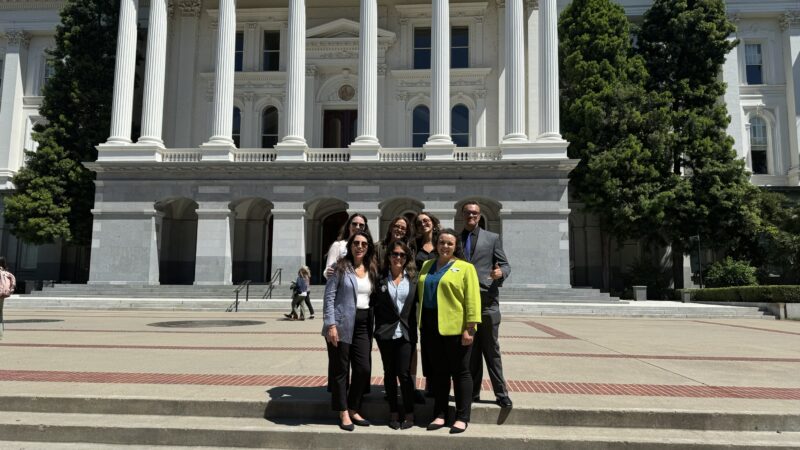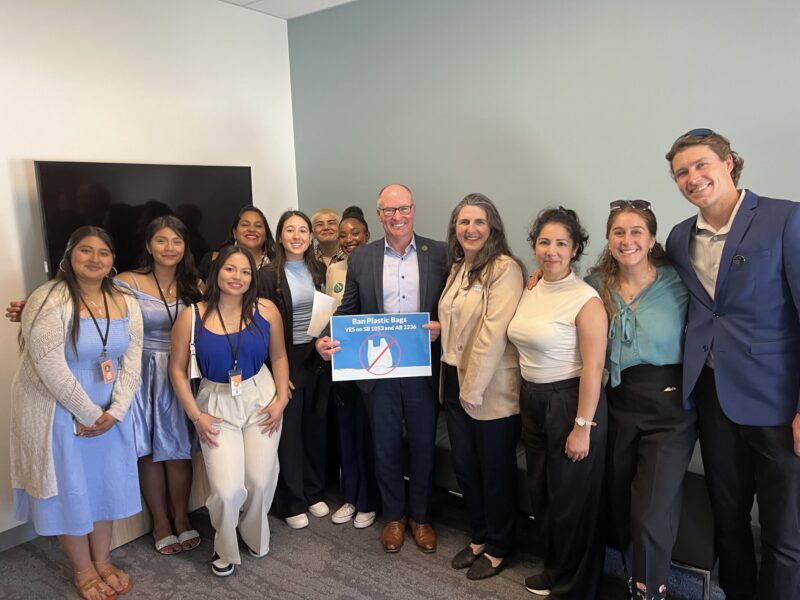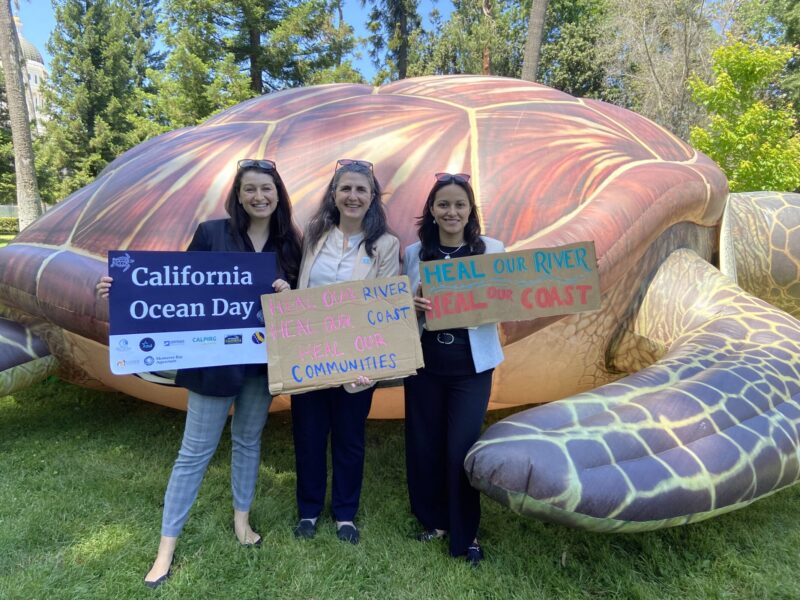Making Waves at the Capitol

Heal the Bay’s policy team recently joined hundreds of advocates from across the state in Sacramento for California Ocean Day. Come along with us to learn more about how our team shapes legislation and how supporters like you can help Heal the Bay protect shorelines up and down the coast.
What is California Ocean Day?
California Ocean Day is an annual event where ocean advocates convene in Sacramento to lobby state leaders in support of legislation that safeguards our coast, ocean, and communities. It’s also a great chance to connect with fellow ocean lovers, activists, and decision makers. This year marked the 19th annual California Ocean Day. The event is open to all and is organized by Surfrider Foundation, Environment California, CALPIRG Students, Azul, and CSU Council on Ocean Affairs, Science & Technology.
What are the top issues we raised with policymakers in the Capitol? What is our goal?
We lobbied for bills that would fight plastic pollution, protect coastal access, improve water quality, protect threatened species, and build ocean resilience in the face of climate change. We also spoke to legislators and their staff about supporting California’s network of 124 marine protected areas (MPAs), restoring the state’s coastal resilience budget, and supporting an equitable climate bond on the ballot this November.
When we visit with elected officials, our goals are to ask for support or opposition on specific state bills, to answer questions, to educate on state bills and ocean issues, to develop relationships, and to let decision makers know what issues are important to Heal the Bay.
What are some bills we have on our radar?
We are now over halfway through the 2024 legislative season, and the bills below are still making their way through the lengthy process to become law. We advocated for these bills at Ocean Day and they have now passed their house of origin (the house where they were first introduced i.e. Senate or Assembly), They are now moving through the opposite house, and are still in need of support.
Assembly Bill 2236 (Bauer-Kahn) and Senate Bill 1053 (Blakespear): Fix the California Bag Ban
A decade ago, California passed the nation’s first plastic bag ban, helping to reduce pollution from single-use plastic bags at grocery stores. But, due to a loophole in the bill, stores are still distributing thicker plastic bags, claiming them to be reusable. This pair of bills would close this major loophole to ensure consumers are given actual reusable bags or single-use paper bags. The legislation tightens standards for reusable bags and requires stores to provide paper bags made from a required minimum of recycled content.
Assembly Bill 2761 (Hart & Lowenthal): Reducing Toxics in Packaging Act
Amid growing concerns over toxic chemicals found in everyday products, AB 2761 is a crucial measure to protect both the environment and public health by targeting hazardous substances in plastic packaging. This bill would ban poly- and perfluoroalkyl substances (PFAS), polyvinyl chloride (PVC), and polyvinylidene chloride (PVDC) from all plastic packaging. These substances, often found in packaging, are known to pose serious health risks, including cancer, hormone disruption, and liver damage.
Assembly Bill 2214 (Bauer-Kahan): Implementing the Statewide Microplastics Strategy
Growing concerns over microplastics, which account for at least 85% of marine waste and can cause health issues like reproductive difficulties and endocrine disruption, prompted the introduction of this measure. This bill mandates the California Ocean Protection Council to establish an interagency coordination group to tackle microplastics pollution by implementing the already existing Statewide Microplastics Strategy. This legislation is crucial for protecting both ocean and public health and tackling microplastic pollution from the source.
With so much competition from other pressing issues, what is our strategy for raising our issues on lawmakers’ agendas?
When we meet with decision-makers, we prioritize speaking to what is important to that lawmaker. For example, some representatives are really focused on a healthy economy, so we focus on laws that help to build a blue economy, while also conserving our ocean and coast. For others, bills that focus on environmental justice goals, such as climate bills and coastal access bills, truly resonate. Effective advocacy is all about connecting with our audience. By learning as much as we can about the legislators we are speaking with, we can drive our message home and get the focus these issues need to implement real change.
How do we work with other allies to get things done?
When we go to Sacramento, we join other organizations interested in the same collective goal. We split into inter-organizational teams and attend scheduled meetings with elected officials or their staff. Typically, Heal the Bay is part of three or four teams, so our message regarding the health and safety of Los Angeles’ watersheds and coastal region is heard by a wider audience of legislative offices.
During California Ocean Day, Heal the Bay joined numerous other organizations including Surfrider, Black Surfers Collective, California Coast Keeper Alliance, AZUL, Sacred Places Institute for Indigenous Peoples, CAL PIRG, 5 Gyres, Environment California, and many others. Our voices are most powerful when we come together, which makes lobby days like Ocean Day so effective.
How do we remain optimistic when bureaucracy moves slowly and bills sometimes die before coming to a vote?
This is perhaps the hardest part of our jobs as advocates. Just this year, Heal the Bay began the legislative season co-sponsoring Senate Bill 1167 (Blakespear) which would have required reusable cups for dining in at chain restaurants across the state. While we put a great deal of effort into pushing this bill forward, it sadly did not pass out of its first committee. It can be a gutting moment, but our team has honed the skill of learning from these experiences and going back to the drawing board with an even better law. Good laws don’t pass overnight, and with time, we often end up with an even better piece of legislation than we would have on our first attempt. That is the real silver lining in temporary defeat. We are already excited to focus on passing reuse laws locally here in Los Angeles to help boost our next attempt at a state law.
How can the general public support our policy and legislative work?
Make your voice heard. The best way to get bills passed is for decision-makers to hear from their constituents – that means YOU! It may sound trite, but your voice really does matter. A phone call to your representative can mean the difference between a bill becoming law or not. Head to https://findyourrep.legislature.ca.gov/ to find out who your state representatives are. Call them and ask them to vote YES on the bills we listed above.
Use this handy script to make your phone call extra easy:
“Hi, my name is __________ and I am a resident of __________ and a constituent of representative__________. As an active member of my community with concerns about our oceans and public health, I urge you to vote YES on SB 1053, AB 2236, AB 2761, and AB 2214. These bills will protect our oceans and the health of my community by reducing plastic pollution and removing dangerous chemicals from products I use. Thank you for your time.”
Beyond taking action, you can follow along on our work! Through our channels, like social media, newsletters, and blogs like this one, Heal the Bay shares updates on the laws we are working on and action alerts to get the community involved. Attend an advocacy training, follow us on Instagram, become a volunteer, clean up a beach, or donate to our cause – all these actions greatly help support our work and our broader goal of healthy, safe, clean water for all Angelenos.





